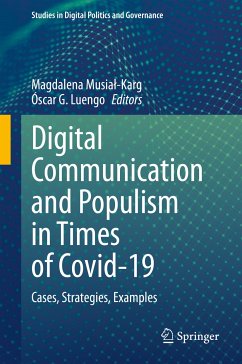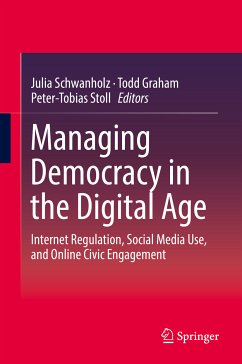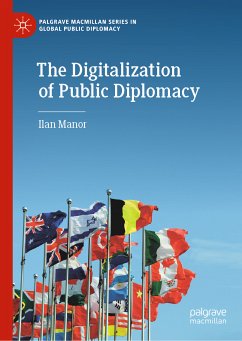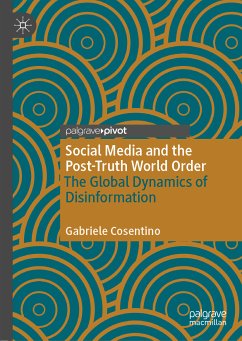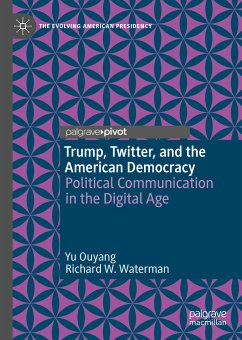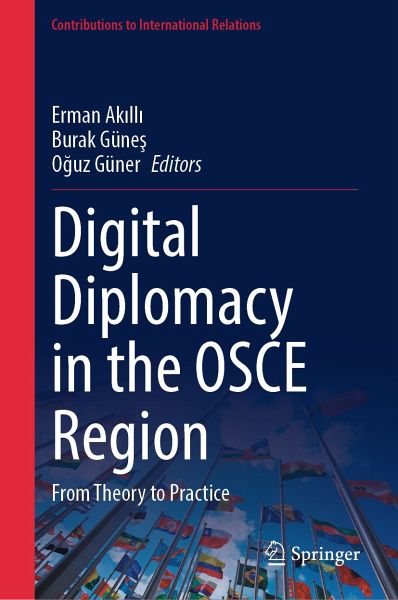
Digital Diplomacy in the OSCE Region (eBook, PDF)
From Theory to Practice
Redaktion: Akilli, Erman; Güner, Oguz; Günes, Burak
Versandkostenfrei!
Sofort per Download lieferbar
88,95 €
inkl. MwSt.
Weitere Ausgaben:

PAYBACK Punkte
44 °P sammeln!
This edited volume examines the practices and applications of digital diplomacy in the OSCE Region. As a security organization, the Organization for Security and Cooperation in Europe (OSCE) prioritizes its member states' cyber security and cyberspace activities. The book examines two key areas where digital diplomacy challenges traditional diplomatic practices of the OSCE member States: institutional adaptation and policy innovation in the OSCE Region. It (1) investigates how capable and motivated foreign ministries are at the institutional level to shift to digital diplomacy, and (2) explore...
This edited volume examines the practices and applications of digital diplomacy in the OSCE Region. As a security organization, the Organization for Security and Cooperation in Europe (OSCE) prioritizes its member states' cyber security and cyberspace activities. The book examines two key areas where digital diplomacy challenges traditional diplomatic practices of the OSCE member States: institutional adaptation and policy innovation in the OSCE Region. It (1) investigates how capable and motivated foreign ministries are at the institutional level to shift to digital diplomacy, and (2) explores how digital diplomacy affects the fundamental diplomatic tasks of representation, communication, and relationship management at the policy level.
Technological advances in IT and the Internet's widespread introduction in the wake of the 2000s provided new territories to conquer for states to pursue their interests. Moreover, technological developments and media attention enhanced information flow and communication through new platforms like online encyclopedias (i.e., Wikipedia), video-sharing sites (i.e., YouTube), and social media platforms (i.e., Facebook, Instagram, Twitter). Because of these transformations, public opinion became influential in diplomacy, and a greater need to include foreign publics as part of foreign policy goals emerged.
Introducing case studies from several OSCE countries, presented by an international group of authors, this book provides a timely response to current affairs and policy debates by providing pluralistic perspectives from different countries and disciplines, such as international relations, political science, international law, and political economy). It will appeal to students, researchers, and scholars of the aforementioned disciplines, as well as policy-makers and practitioners interested in a better understanding of digital democracy and digital diplomacy in the OSCE region.
Technological advances in IT and the Internet's widespread introduction in the wake of the 2000s provided new territories to conquer for states to pursue their interests. Moreover, technological developments and media attention enhanced information flow and communication through new platforms like online encyclopedias (i.e., Wikipedia), video-sharing sites (i.e., YouTube), and social media platforms (i.e., Facebook, Instagram, Twitter). Because of these transformations, public opinion became influential in diplomacy, and a greater need to include foreign publics as part of foreign policy goals emerged.
Introducing case studies from several OSCE countries, presented by an international group of authors, this book provides a timely response to current affairs and policy debates by providing pluralistic perspectives from different countries and disciplines, such as international relations, political science, international law, and political economy). It will appeal to students, researchers, and scholars of the aforementioned disciplines, as well as policy-makers and practitioners interested in a better understanding of digital democracy and digital diplomacy in the OSCE region.
Dieser Download kann aus rechtlichen Gründen nur mit Rechnungsadresse in A, B, BG, CY, CZ, D, DK, EW, E, FIN, F, GR, HR, H, IRL, I, LT, L, LR, M, NL, PL, P, R, S, SLO, SK ausgeliefert werden.



